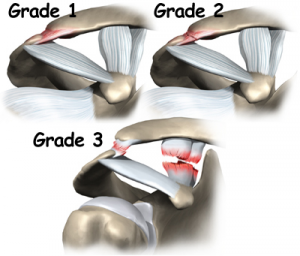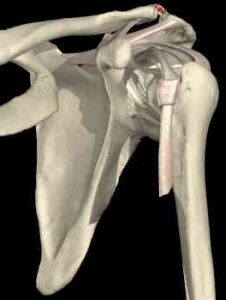Sport Rehabilitation and Physiotherapy for an Acromioclavicular Joint (AC Joint) Sprain.


What is an Acromioclavicular Joint Sprain?
It is a tear or disruption of the ligament(s) that attach the clavicle (collarbone) to the acromion process (part of the shoulder blade). There are three grades which vary from a mild sprain to total disruption.
What Causes an Acromioclavicular Joint Sprain?
The classic causes are; –
Direct trauma – from a direct blow to the acromion, such as a heavy fall against a wall, or a rugby tackle.
Indirect trauma – a fall on the outstretched arm or elbow.
What are the symptoms of an Acromioclavicular Joint Sprain?
Pain at the top of the shoulder particularly when reaching across the body, lifting the arm or sleeping on the affected side. There may also be pain in the neck muscles. If left untreated the shoulder complex may develop functional instability during sporting or everyday activities.
What treatments are most commonly used for an Acromioclavicular Joint Sprain?
The aim is to reduce inflammation and pain whilst optimising functional movement and strength.
Massage – Encompassing a variety of techniques and is given with sufficient pressure through the superficial tissue to reach the deep lying structures. It is used to increase blood flow, decrease swelling, reduce muscle spasm and promote normal tissue repair.
Taping/Strapping – May be used if thought necessary to restrict abnormal movement and prevent further damage.
Deep friction – Is an aggressive massage technique applied across the tissue fibres as deeply as possible. This technique is initially painful but can cause a numbing effect. It can be used to break down scar tissue, restore normal movement and prepare the injured structure for mobilisation.
Mobilisation – Is a manual technique where the joint and soft tissues are gently moved by the therapist to restore normal range, lubricate joint surfaces and relieve pain.
Ultrasonic therapy – Transmits sound waves through the tissues stimulating the body’s chemical reactions and therefore healing process, just as shaking a test tube in the laboratory speeds up a chemical reaction.
Interferential therapy – Introduces a small electrical current into the tissues and can be used at varying frequencies for differing treatment effects. E.g. pain relief, muscle or nerve stimulation, promoting blood flow and reducing inflammation.
What other treatments could be used for an Acromioclavicular Joint Sprain?
Acupuncture – An oriental technique of introducing needles into the skin to increase or decrease energy flow to promote pain relief and healing.
Injection Therapy – A specialist procedure, during which a non-harmful steroid and local anaesthetic are injected directly into the injured structure. It has a dramatic effect on removing inflammation and promoting healing.
What can you do yourself to help an Acromioclavicular Joint Sprain?
Exercise / Postural programme – This is the most important part of the rehabilitation. Your therapist will instruct you as to which exercises to begin with, when to add the others, as well as how to progress the exercises.
Medication – Ask your GP or Pharmacist for advice on the best medication for your condition.
Apply an ice pack – for a maximum of 20 minutes. A bag of frozen peas wrapped in a damp cloth works well because it moulds to the shape of the tissues. Ensure that you do not apply ice directly to the skin as this can cause an ice burn.
Ergonomics – Ensure all your seating is encouraging good posture and your work station is set up correctly.
What if treatment does not help or resolve an Acromioclavicular Joint Sprain?
It is very rare that physical therapy does not give great benefit. In these cases a cortisone injection may be appropriate and in very extreme cases surgery is a possible option. These options can be discussed with your therapist if appropriate.
If you think you may have this condition we would love the opportunity to show you our expertise in the treatment and management of this condition so – Please click here for details of how to contact us to book an appointment
If you are unsure whether you have this condition or you would just like to speak to somebody then please get in touch here or call 0161 745 7551.
